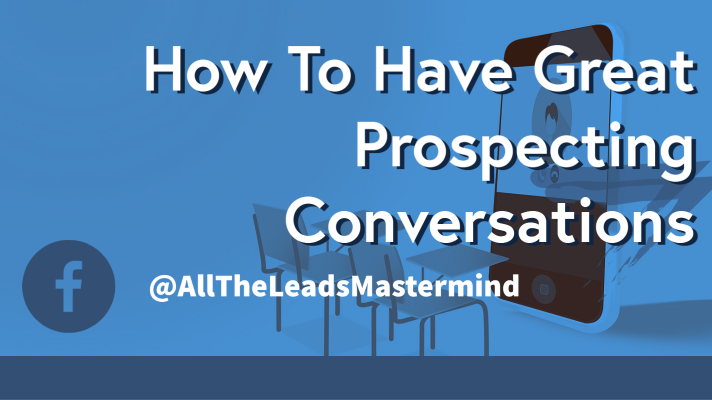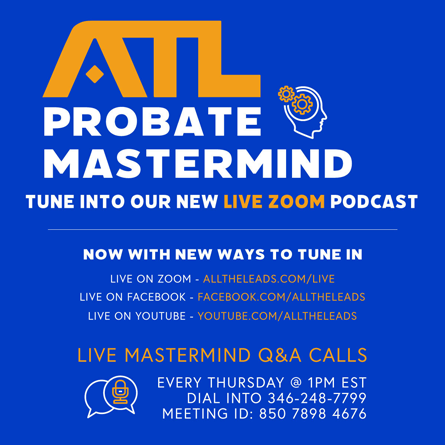
The Questions You Need To Stop Asking.

When speaking with a potential client, what do you say? How do you break the ice? How do you deliver your sales pitch? How do you wrap up and go for the close?
I’ve learned something important in my near decade’s experience in sales, and this one thing has consistently been my “best lesson” whether I was dealing with consumer or B2B, in-person or over the phone, or inbound or outbound selling. This lesson goes far beyond real estate, too.
The questions I opened this article with are the wrong questions.
While these questions did help me settle my nerves and feel a little bit more prepared to speak with prospects, asking them at all shifted me into self-centered mindset.
The Lesson: The center of great sales conversation isn’t you, it’s your potential client, and if you go into a conversation focused on what you feel like or what you sound like, then you’re never going to say exactly “the right thing.”
What Happens When You Start With The Wrong Questions:
Pre-calling nerves used to have me asking myself: “How exactly do I build trust with someone I’m talking to for the first time? That I might only talk to for like, 30 seconds?” Take it from me, these types of questions lead people to:

- Get tangled in small talk – This is especially true when initiating a conversation in person, where physical and environmental cues like a sports team t-shirt, posters on the wall, and other objects are available and begging to be fixated on. But have you ever felt yourself stuck in small talk, waiting for a sales person to just get it over with and tell you what they want you to buy? Did you trust them?
- Jump into a hard-sell of a product or service – Not going to lie, you might get lucky from time to time with this, especially if you make a lot of calls. But by jumping straight to your sales pitch, you’re freezing your window of opportunity to right here, right now. I don’t think it needs to be said how many decisions will not be made in that timeframe.
- Roll out a laundry list of self-flattery: You know you have competition, and you know you need to make yourself worth choosing, and you’ve got like 30 seconds to squeeze as many words in as you can, right? Chances are, if you feel nervous or uncomfortable talking about yourself, your prospect feels twice as uncomfortable listening to it.
Your cold calls will go this way when you’re too focused on saying the right thing, so you really need to stop asking yourself ‘exactly how’ style questions: You can’t know exactly the right thing to say, on every call, to people you have zero relationship with. You just need to focus on people and building relationships with them.
Connection and Credibility: Establishing Trust
In the beginning of any sales relationship, building trust is critical. In strong relationships, connection and credibility both contribute to a prospect’s level of trust in different but positive ways.
Trust that comes through connection building is personal trust. Are you likeable, relatable, and genuine? Do you have a sense of humility, accountability, and vulnerability? Building personal trust is as simple as sharing your why. Why do you do what you do?
On the other hand, credibility relates to professional trust in your skills, knowledge, and ability as it relates to a specific objective. In other words, establishing credibility requires an understanding of what you can do for somebody. Ask your customer about their goals, and then ask secondary questions about anything that might be getting in the way of these goals. You might also ask prospects “which goal is most important to you?”
Figuring Out The Right Questions To Ask:
Questions can be powerful tools for creating connections, driving credibility, increasing urgency and motivation, and confirming value. But to use questions effectively, you must understand your prospect’s situation, their role in that situation, and their goals in navigating that situation.
To prepare yourself for cold-calling, spend 10-15 minutes brainstorming questions you can ask to help you understand:
- Your prospect’s situation
- Your prospect’s role
- Your prospect’s goals
- Any obstacles in the way of those goals.
Then, ask yourself why you do what you do. What’s your role in solving the problems your prospects commonly face? What can you offer that can make your prospects’ goals attainable?
Instead of trying to fit every conversation into pre-determined script, this exercise will help you create a framework to have meaningful, authentic conversations with anyone you speak to.
Conclusion
Take it from me: Prospecting isn’t just calling someone, following up with them (“It’s me again!”), and using sticks and carrots to walk them into a purchasing decision. There’s no logical reason to get caught in analysis paralysis trying to lay out an entire conversation before it even begins. If this is the way you approach sales interactions, you’re going to blend in with your competitors and miss out on anyone who isn’t ready to buy the moment you happen to catch them.
Great prospecting is great relationship-building. It’s about learning and keeping up with your prospects’ interests, needs, and specific situations. Such authentic relationship-building will bring you greater success when engaging prospects, navigating any obstacles that appear during the transaction stage, and winning reciprocal business in the future as these same clients happily join your sphere of influence. Next time you pick up the phone, remember you’re calling your people to have conversations, not just to say exactly the right thing.
This Probate Mastermind Episode has two GREAT examples of relationship-building: Rodger Lecy and Bill Janiga Share Their Food-Gifting Strategy
